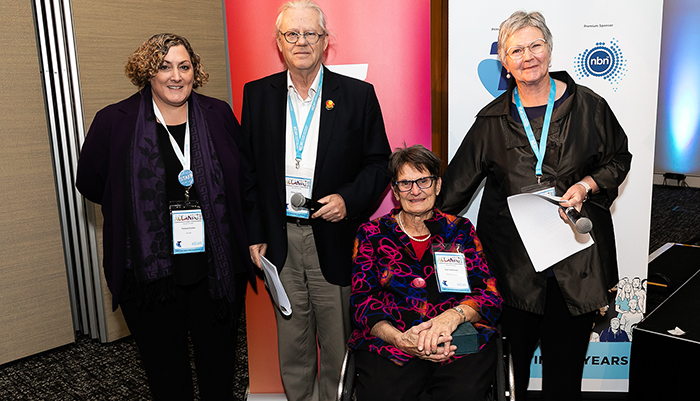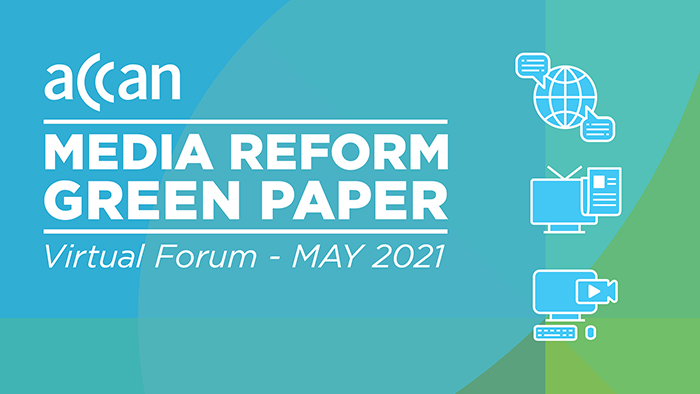Key Dates
Next Grant Round:
Applications for funding will open early 2025.
> Information about our Grants Program
Independent Grants Panel:
Results of the recent EOI will be notified Dec 2024.
> Information about our Panel
We can help: grants@accan.org.au
or phone 02 9288 4000
Subscribe to Grants Program mailings
Following a competitive application process, ACCAN is pleased to announce the successful Grants for 2020.
This year’s projects will explore a range of issues relevant to communications consumers, including how to protect children’s privacy when using apps, regional and rural consumers’ understanding of smart technologies, and the accessibility of video on demand services, among others.
The ACCAN Grants Program funds projects which undertake research on telecommunications issues, represent consumers or create educational tools which empower consumers to derive the greatest benefit from telecommunications products and services.
Research and outcomes achieved by Grants projects inform ACCAN's work and contribute to the broader evidence base for consumers, regulators and service providers in the telecommunications market.
The successful projects are listed below. For more information on the projects, visit the current Grants page.
Read more: 2020 ACCAN Grants projects announced
Write comment (1 Comment) ACCAN board and staff are deeply saddened by the passing of Sue Salthouse.
ACCAN board and staff are deeply saddened by the passing of Sue Salthouse.
Sue was a dedicated advocate for people with disability and made huge contributions to improving the accessibility of telecommunications for people with disability in Australia.
Prior to becoming a member of the inaugural ACCAN Board, Sue was on the Telecommunications Consumer Representation Working Group which developed the proposal for the creation of ACCAN. Sue served as Chairperson following ACCAN’s first AGM in 2009 and stayed on as a member of the board until 2012. Sue also offered support to ACCAN’s Standing Advisory Committee on Disability Issues, as Chair of the Committee from 2009-2010. In recognition of her pivotal and enduring commitment to communications consumers, Sue was awarded ACCAN Life Membership in 2019.
Read more: A Message From ACCAN on Sue Salthouse
Write comment (25 Comments)
ACCAN responded to the draft Bill1 regarding the COVIDSafe app in collaboration with 17 organisations flagging concerns of consumer groups across the fields of health, technology, privacy, human rights, digital inclusion, communications and community interests.
Read more: ACCAN Comments on COVIDSafe App
Write comment (0 Comments)For World Consumer Rights Day 2020, ACCAN looks at how consumers can do their part to promote sustainability in the telco sector.
Sustainability is an evolving issue for industries around the world. Consumers are increasingly concerned about the way that we produce and consume goods and services, including in the telco sector.
Nearly 90% of Australians now own a mobile phone1. For many of us, they have become the go-to device to keep in touch socially and for work, to take photos, and to navigate from place to place. As mobile phones continue to evolve to include features like foldable screens and multi-lens cameras, it’s worth taking a moment to consider what resources go into making these smart devices.
Read more: World Consumer Rights Day – Sustainable telco consumers
Write comment (0 Comments)As bushfires continue to burn across the country, a reliable phone service quickly becomes a lifeline.
ACCAN is aware of reports of network outages due to blackouts and power failures in bushfire affected areas. It’s important to know that unless you have a battery back-up, your NBN home phone will not work during a power outage. As a precaution, it is best to have a charged mobile phone that you can use during a power outage.
Read more: Telco bushfire response
Write comment (0 Comments) Struggling with the cost of your internet or phone service? ACCAN has put together a list of telco offers to help targeted groups stay connected.
Struggling with the cost of your internet or phone service? ACCAN has put together a list of telco offers to help targeted groups stay connected.
As this list only shows offers for targeted groups, there may be alternative products and services out there for general consumers that meet your needs, so it’s also worth comparing plans. To do so, head to an online comparison site, such as WhistleOut or Finder. ACCAN has also prepared a money saving guide with tips to reduce your telco bill.
If you are unable to meet your bills and are in financial hardship, check out ACCAN’s hardship portal for more information on what you can do.
Read more: What programs and offers are available to help you stay connected?
Write comment (5 Comments)
When disaster strikes, you want to be able to call for help. As Australia makes the switch to the NBN, it’s important to know that traditional methods of connecting to emergency services may not work.
In the event of a power outage, phone and internet services provided over the NBN network will not work. This will also affect any medical alarms or security alarms that you may have which connect through the NBN.
Read more: Staying connected during emergencies
Write comment (0 Comments)What media reforms are proposed in the Green Paper?
Spectrum reform
The key reform proposal relates to technical changes in the way broadcasting content might be delivered. Australian broadcast television is delivered using ‘spectrum’, and there is only a finite amount of spectrum available. Currently, all of the available spectrum is being used for free-to-air television broadcasting.
However, new digital broadcasting technology means less spectrum can now be used to deliver the same broadcasting services. The Government would like television broadcasters to work together to use less spectrum because:
- If enough broadcasters agree to broadcast on less spectrum, there will be more free spectrum available to be used for other purposes. One of these potential purposes is to reallocate that spectrum to improve telecommunications networks in currently underserviced areas.
- Because the amount of spectrum available is finite, it is a valuable asset. The Government could auction off this spectrum for a profit, which it says could then be re-invested. A fund could be established to support more regional news and more Australian drama, documentary and children’s content.
- For example, the profit could be invested in more local news services in regional, rural and remote areas of Australia, and/or local television and film content production. The Green Paper doesn’t specify how much of the profit would be invested in local and regional news, or Australian content production.
Read more: Background to the Media Reform Green Paper
Write comment (0 Comments)Background

In March 2018 it was revealed that the data firm, Cambridge Analytica, gained unauthorised access to almost 87 million (primarily United States) Facebook users’ data. Also implicated was Cambridge Analytica’s British counterpart, Strategic Communication Laboratories.
Facebook users’ data was harvested through the two data firms through a personality-quiz app created by Cambridge psychology professor, Aleksandr Kogan, named “This Is Your Digital Life”. Facebook confirmed that only 270,000 Facebook users downloaded Kogan’s app, but Facebook has not yet refuted claims that up to 87 million users’ data had been accessed. During this time, when Facebook users downloaded apps connected to their Facebook accounts, they also exposed data from many of their friends to the app developer, hence, the large estimated number of users affected.
Read more: Cambridge Analytica and Facebook: The Aftermath
Write comment (0 Comments) Over the last ten years, faster internet speeds have dramatically impacted the way that Australians consume media. Many Australians have switched from free-to-air television (FTA) to subscription video on demand services. These include streaming services like Netflix, Stan, and Kayo and broadcast video on demand (FTA catch-up services, or BVOD). According to the ACMA, 77% of Australian households now have at least one SVOD service, compared to 61% in 20171.
Over the last ten years, faster internet speeds have dramatically impacted the way that Australians consume media. Many Australians have switched from free-to-air television (FTA) to subscription video on demand services. These include streaming services like Netflix, Stan, and Kayo and broadcast video on demand (FTA catch-up services, or BVOD). According to the ACMA, 77% of Australian households now have at least one SVOD service, compared to 61% in 20171.
With viewers switching from free-to-air to online content, there have been many questions raised about how the traditional media industry can sustain itself in a world where advertising dollars follow audiences; with less people tuning in to traditional media, these outlets are less attractive to advertisers. Regional newspapers and television channels are also closing because of loss of advertising revenue. To help keep Australia’s media sector alive, the Government needs to find a way to modernise television regulation.
With the expansion in dependency on data services and roll-out of 5G Mobile, the government is also looking at how they manage the limited spectrum used for telecommunications and broadcasting.
To encourage input and debate from interested parties about how the media laws should be changed, the Government released a Green Paper in November 2020 with proposals for new ways to fund Australian media and how it operates.
Read more: Media Reform Green Paper – Modernising Television Regulation in Australia
Write comment (0 Comments) As we head into the festive season, many of us will be thinking about what new gadget we’d like to find under the Christmas tree or snap up in the Boxing Day sales. With the telcos stepping up their advertising around 5G, many people have started to look into purchasing 5G phones and home broadband plans. If you’re keen to be one of these early-adopters, don’t sign on the dotted line before you’ve read our tips below.
As we head into the festive season, many of us will be thinking about what new gadget we’d like to find under the Christmas tree or snap up in the Boxing Day sales. With the telcos stepping up their advertising around 5G, many people have started to look into purchasing 5G phones and home broadband plans. If you’re keen to be one of these early-adopters, don’t sign on the dotted line before you’ve read our tips below.
Read more: Christmas wrap-up: 5G phones
Write comment (1 Comment)  ACCAN welcomes the Government’s recent announcement that it will provide a total of $4 Million in funding to the national broadcasters, ABC and SBS, to introduce audio described broadcast content in the 2020/21 financial year. ACCAN, along with Australia’s blindness sector and consumer groups have been advocating for the introduction of audio description across free-to-air television for many years.
ACCAN welcomes the Government’s recent announcement that it will provide a total of $4 Million in funding to the national broadcasters, ABC and SBS, to introduce audio described broadcast content in the 2020/21 financial year. ACCAN, along with Australia’s blindness sector and consumer groups have been advocating for the introduction of audio description across free-to-air television for many years.
Audio description is a verbal narration of visual elements of programming. The narration coincides with the program’s audio track with the description interspersed between dialogue.
Read more: ACCAN welcomes Government's Audio Description funding
Write comment (1 Comment)